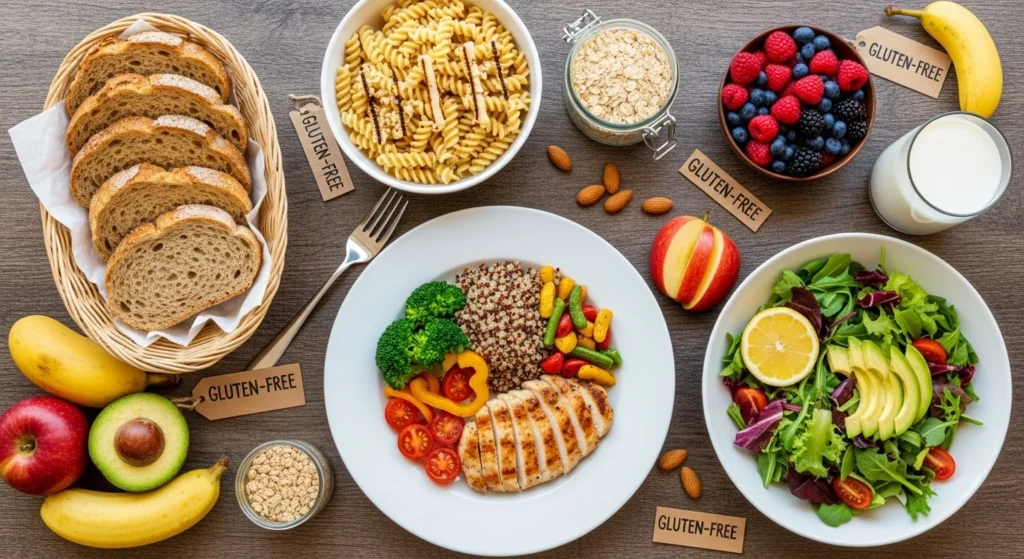Are you worried about thinning hair or shedding after switching to a gluten free diet and hair loss seems to be worsening? For many people with celiac disease or gluten sensitivity, this connection is confusing and stressful.
In this article, you’ll learn how gluten affects hair health, why deficiencies on a gluten-free diet matter, and what you can do to support regrowth. Backed by medical insights and practical advice, this guide helps you understand the causes, recovery timelines, and when to seek expert care.
Understanding the Link Between a Gluten-Free Diet and Hair Loss

Hair loss in relation to gluten is complex. For some, it’s triggered by autoimmune reactions; for others, nutrient deficiencies may play a bigger role. Let’s break it down.
Celiac Disease and Hair Loss – Mechanisms Explained
Celiac disease is an autoimmune disorder in which gluten (a protein found in wheat, barley, and rye) triggers the immune system to attack the small intestine. This damage affects nutrient absorption.
- Poor absorption of iron, zinc, and vitamin D directly impacts hair follicle health.
- Chronic inflammation can disrupt the natural hair cycle, leading to thinning.
- Some patients experience alopecia areata (patchy hair loss) linked to autoimmune activity.
Non-Celiac Gluten Sensitivity (NCGS) and Hair Thinning
Not everyone with gluten-related hair issues has celiac disease. NCGS can also cause systemic inflammation. Though the mechanism is less defined, reports show:
- Increased scalp inflammation
- Diffuse hair shedding
- Improvement in symptoms after adopting a gluten-free diet
Autoimmune Connections: Alopecia Areata & Dermatitis Herpetiformis
- Alopecia areata: An autoimmune condition causing patchy bald spots, sometimes coexisting with celiac disease.
- Dermatitis herpetiformis: A gluten-related skin condition that often coincides with hair/scalp irritation.
How Nutrient Deficiencies Play a Role
Going gluten-free can help heal the gut—but it can also lead to nutritional pitfalls if the diet isn’t balanced.
Common Deficiencies (Iron, Zinc, B-Vitamins)
- Iron deficiency → one of the most common causes of hair thinning.
- Zinc deficiency → slows down follicle regeneration.
- Biotin and B vitamins → essential for keratin production.
Impact of Gluten-Free Processed Foods on Nutrient Intake
Many packaged gluten-free products lack fortification and may be high in sugar and low in fiber. Over time, this can create nutrient imbalances that worsen hair shedding.
Pro Tip: Always pair a gluten-free diet with nutrient-dense whole foods like quinoa, buckwheat, brown rice, leafy greens, beans, and nuts.
How a Strict Gluten-Free Diet Can Help Hair Regrowth
The good news? With proper management, hair can often regrow after the body heals.
Healing the Gut—Timeline and Expectations
- First 3–6 months: Gut lining begins to repair; nutrient absorption improves.
- 6–12 months: Many patients notice reduced shedding and stronger new growth.
- 12+ months: Full regrowth may occur if follicles remain active.
Regrowth Statistics & What the Research Says
According to studies, up to 82% of patients with gluten-triggered alopecia see regrowth within 9–12 months of starting a strict gluten-free diet.
When Hair Loss Persists (Red Flags & Next Steps)
If hair loss continues despite following a gluten-free diet:
- Rule out androgenetic alopecia (male/female pattern hair loss)
- Get tested for thyroid disorders (common with celiac disease)
- Consult a dermatologist for advanced therapies like PRP or hair transplant evaluation
Practical Tips for Supporting Hair Health on a Gluten-Free Diet
Choosing Nutrient-Rich, Whole-Food Alternatives
- Swap refined gluten-free bread for quinoa or brown rice.
- Add leafy greens, beans, and lentils to boost iron and folate.
- Include pumpkin seeds and nuts for zinc.
Supplementation and Monitoring
- Check ferritin, vitamin D, and zinc levels regularly.
- Consider supplements only after medical consultation.
- Gluten-free multivitamins may help fill gaps.
Lifestyle Add-ons
- Scalp massage: Improves circulation.
- Stress management: Yoga, meditation, or breathing exercises reduce hair-shedding triggers.
- Professional treatments: Consider low-level laser therapy or PRP under specialist guidance.

FAQs
Can gluten cause hair loss if I’m not celiac?
Yes, non-celiac gluten sensitivity may still trigger inflammation and hair shedding, although it’s less common than with celiac disease.
How long will it take for my hair to regrow on a gluten-free diet?
Most people notice improvement within 6–12 months, though timelines vary.
Could hair loss be from androgenetic alopecia instead?
Yes. If hair loss continues despite dietary change, consult a dermatologist to rule out pattern baldness.
Are gluten-free products nutritionally adequate—or harmful?
Gluten-free processed foods may lack nutrients. Always prioritize whole foods and supplements where necessary.
Next Steps
Hair loss linked to gluten can feel overwhelming, but recovery is possible with the right approach. A balanced gluten-free diet, nutrient support, and medical guidance can help restore both your health and confidence.
Book a consultation with Dr. Rana Irfan in Islamabad today to evaluate your hair loss and receive a personalized recovery plan.
